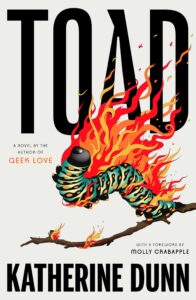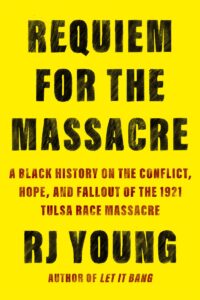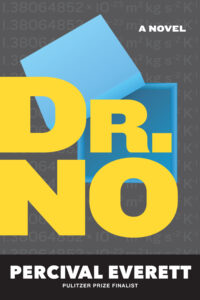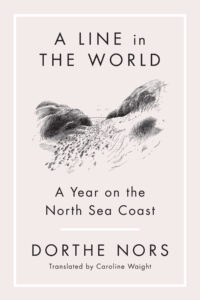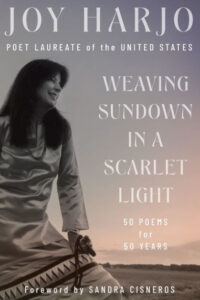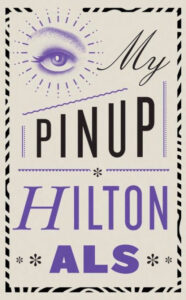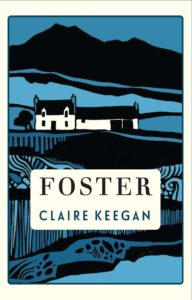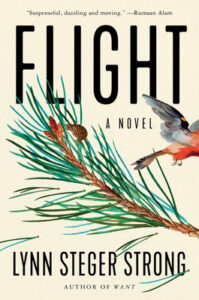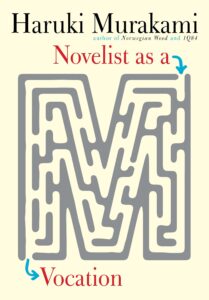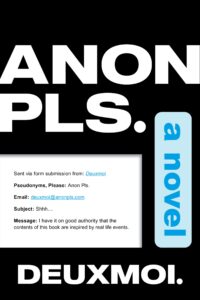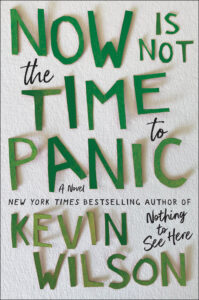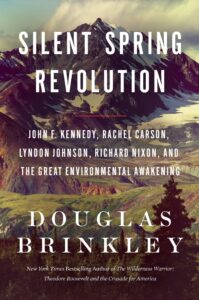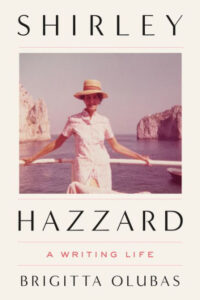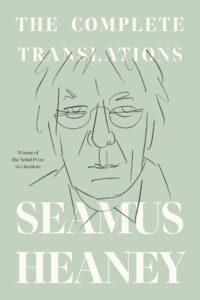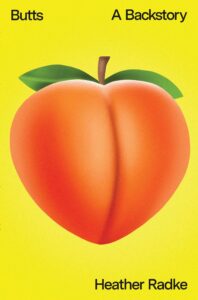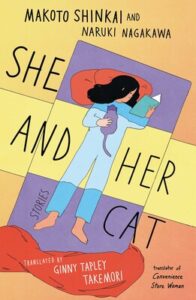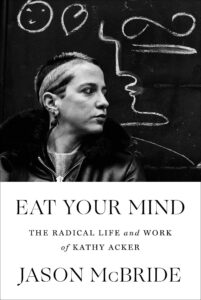NOVEMBER
RJ Young, Requiem for the Massacre
Counterpoint, November 1
It’s been just over a century since the Tulsa massacre, one of the worst and most notorious acts of racial violence in modern American history. In this new book, writes Kaitlyn Greenidge, RJ Young “rescues an event that has already crossed over for many into myth, returning it to its human origins and reminding us of the toll of its historical afterlives.” Essential reading for the next hundred years. –ET
Katherine Dunn, Toad
MCD, November 1
It feels like forever ago that we learned that MCD would be blessing us with not one but two previously unpublished Katherine Dunn books. This, at last, is the first one, a campus novel inspired by Dunn’s time at Reed College, which the publisher describes as “colorful, crass, and profound” as well as “daring and bizarre” (much like Geek Love). We are not worthy. –ET
Percival Everett, Dr. No
Graywolf, November 1
A caper novel from the great Percival Everett starring a mathematician who literally studies the concept of “nothing”? Does it feature a kind of femme fatale named Eigen Vector? Is there a heist involved? Even just a YES to one of these questions would do it for me, but wow. –JD
Dorthe Nors, tr. Caroline Waight, A Line in the World: A Year on the North Sea Coast
Graywolf, November 1
The North Sea—bordered by Norway, Denmark, Germany, Great Britain, and several other northern European countries—is the beguiling setting for this nonfiction book by Dorthe Nors. Her year-long voyage on the coast turned into this meditation on the area’s landscape and history and the communities that make their home there today. –CS
Joy Harjo, Weaving Sundown in a Scarlet Light: Fifty Poems for Fifty Years
W.W. Norton, November 1
A celebration of three-time US Poet Laureate Joy Harjo’s half century as a poet, Weaving Sundown in a Scarlet Light brings together 50 of Harjo’s most beloved poems, drawn from her nine volumes of verse, “beginning with her early discoveries of her own voice and ending with moving reflections on our contemporary moment.” This indispensable compendium by a true living legend, the kind every poetry lover should be putting at the top of their Holiday wish list, also features a foreword by The House on Mango Street author Sandra Cisneros. –DS
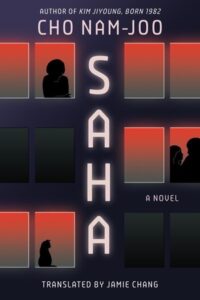
Cho Nam-Joo, tr. Jamie Chang, Saha
Liveright, November 1
Cho Nam-Joo’s Kim Jiyoung, Born 1982, an artful treatise on misogyny, was an international bestseller, and in her newly translated Saha, she turns her keen eye to disenfranchised workers and the depraved corporations who abuse them. The residents of Saha Estates, located in a former fishing village bought out by an Orwellian conglomerate, aren’t valuable in the eyes of their capitalistic overlords. Nam-Joo tells their stories in this haunting, necessary read. –ES

Timothy Bella, Barkley: A Biography
Hanover Square, November 1
The definitive biography of Charles “the round mound of rebound” Barkley? Leeds, Alabama’s favorite son Charles Barkley? Phoenix Suns legend and Space Jam scene-stealer Charles Barkley? 1993 league MVP and 11x All-Star Charles Barkley? Emmy-winning pundit Charles Barkley? Joyful, self-deprecating, unscripted and uninhibited highlight of my Thursday nights Charles Barkley? You better believe I’ll be reading this. –DS
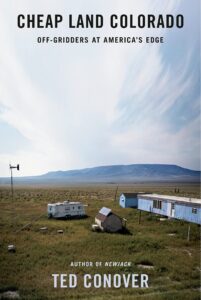
Ted Conover, Cheap Land Colorado: Off-Gridders at America’s Edge
Knopf, November 1
At this rate, we’re all going to be off-the-grid, whether we like it or not… so why not get familiar with the concept? In Cheap Land Colorado, Ted Conover heads west to live an off-grid life with a random assortment of Americans who’ve set up a community in the failed rural subdivisions of Colorado’s San Luis Valley. Though society might disdainfully call them dropouts, this collection of apocalyptic cosplayers has merely chosen to exchange one set of experiences for another, opting for a sense of space and freedom over the constraints of conventional life. –JD
Hilton Als, My Pinup
New Directions, November 1
I would read anything that Hilton Als writes—as a staff writer for the New Yorker and a theater critic, his work is always as absorbing as it is challenging. My Pinup, a memoir, seems unlike anything he’s ever published before: an account of his life in the nightclub scene, of queer longing, of romance and loss. –CS
N.K. Jemisin, The World We Make
Orbit, November 1
In her follow up (and conclusion to) The City We Became, the six human avatars of New York will have to team up with other great cities from around the world to defeat the Woman in White and mysterious Enemy and thus keep the universe from utter and total peril. It’s always the right time for a new Jemisin. –ES
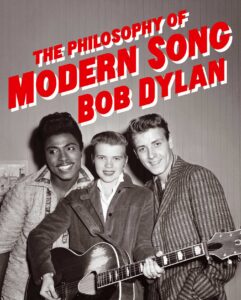
Bob Dylan, The Philosophy of Modern Song
Simon & Schuster, November 1
A new book of essays and photos from bestselling author, recent recipient of the Nobel Prize in Literature, and . . . some other thing, I think. Who’s this guy again? –ET
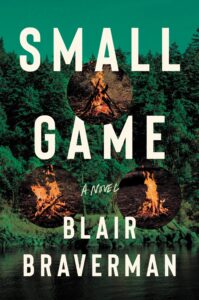
Blair Braverman, Small Game
Ecco, November 1
Blair Braverman (Welcome to the Goddamn Ice Cube and that viral Twitter thread of her sled dogs smiling) is turning to fiction, and I’m here for it. Mara teaches survival skills to rich tourist types, and when she’s approached to be a contestant on a reality show called Civilization, she agrees for the paycheck. But things don’t go as planned, and her fellow castmates might not be up to the challenge. –ES
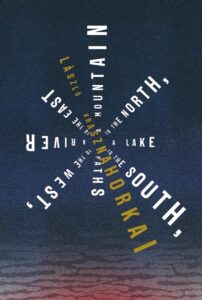
László Krasznahorkai, tr. Ottile Mulzet, A Mountain to the North, a Lake to the South, Paths to the West, a River to the East
New Directions, November 1
Something something meditation on life and death and nature… Look, it’s a newly translated novel by the National Book Award-winning Krasznahorkai. If you know you know. –JD

Franny Choi, The World Keeps Ending, and the World Goes On
Ecco, November 1
“I was born from an apocalypse / and have come to tell you what I know—which is that the apocalypse began / when Columbus praised God and lowered his anchor.” These lines, coming in the middle of the poem “The World Keeps Ending, and the World Goes On,” are a hint to what’s to come in this collection: a look at the violences of history and the world they have created as well as what’s next. Franny Choi’s poems are arresting, sharp; they demand we listen and follow her where she wants to take us. –CS
Claire Keegan, Foster
Grove Press, November 1
Claire Keegan has written four brief, nigh-on perfect books over the last 23 years. Her career began with a pair of short story collections—Antarctica (1999) and Walk the Blue Fields (2007)—that all at once announced her as one of the greatest practitioners of the short prose form at which Irish writers historically have excelled and as the heir both to the unapologetic causticity of an Anne Enright and the Christ-its-beautiful-but-grim-in-the-Irish-countryside lyricism of a John McGahern. After that followed two novellas, Foster (2010) and Small Things Like These (2021), the first of which began as a short story that won the Davy Byrne’s Irish Writing prize in 2009, then became a somewhat longer story in The New Yorker the following year, before appearing as a standalone volume. In many respects, Foster, now published by Grove, is a simple story.
It follows a young girl sent away while her mother is pregnant to live with some family friends, from whom she begins to receive the love and care she has been lacking and for whom she begins to fill the absence opened by the loss of their own child. The book, though, is elevated far above the humility of its plot and structure by the sheer brilliance of Keegan’s writing—which is to say, by her bottomless empathy for her characters, by her elegiac descriptions of the natural world, and, above all, by her total ability to inhabit the developing perspective of a child and bring the girl to life, while gripping the reader across a gulf of ironic distance with a tone and tenor that are compassionate and heartbreaking where a thousand lesser writers end up cheap and patronizing. It’s in the nature of literary journalism for critics to deem this kind of book “Among the finest stories written in English,” as The Observer, duly, did. It’s a cliché and it’s almost always bullshit or at least hyperbole. But in this case, it’s absolutely true. –EF
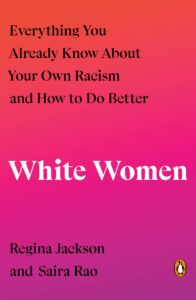
Regina Jackson and Saira Rao, White Women: Everything You Already Know About Your Own Racism and How to Do Better
Penguin Books, November 1
Regina Jackson and Saira Rao have put together a no-holds-barred manual for deconstructing one’s own white supremacy, and thus breaking down the greater patriarchal and racist structures at play. Jackson and Rao focus on the concept of “niceness”: how it’s dominated the idea of white womanhood and how white women have actively contributed to upholding the value while it also constricts and oppresses not only people of color, but white women themselves. Jackson and Rao work to help women look past the veneer of niceness to see what it actually is and does, and how true kindness is the real, raw work of calling each other out, educating ourselves, and changing the engrained facts of our white supremacist society that we often take for granted. –JH
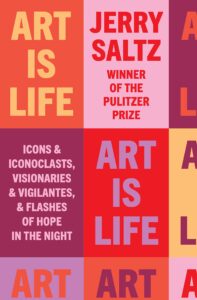
Jerry Saltz, Art Is Life: Icons and Iconoclasts, Visionaries and Vigilantes, and Flashes of Hope in the Night
Riverhead, November 1
Jerry Saltz’s Pulitzer-winning work has for decades given us countless insights into the artists who make, remake, and upend our culture. This book offers a range of his thoughts on important contemporary artists including Kara Walker, David Wojnarowicz, Marina Abramović, Kehinde Wiley, and many others, as well as musings into history, celebrity culture, and his relationship to art. –CS
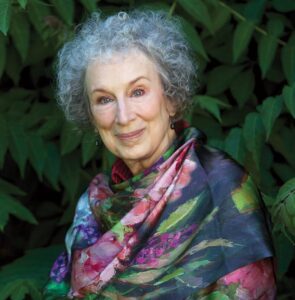
Margaret Atwood ed., Fourteen Days: An Unauthorized Gathering
Harper, November 1
Okay, I’ll bite. This is that Covid round robin book you might’ve heard about, in which each character—tenants in a Lower East Side apartment building during the early days of the pandemic—is secretly written by a different author. Including the likes of Margaret Atwood, Dave Eggers, R. L. Stine, R. O. Kwon, Neil Gaiman, Nora Roberts, and Tommy Orange, it should be an interesting experiment in collective storytelling. –ES
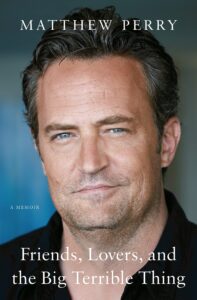
Matthew Perry, Friends, Lovers, and the Big Terrible Thing: A Memoir
Flatiron, November 1
I don’t have to read further than the author’s name to know I am reading this memoir. Friends has its fair share of cynical nay-sayers, sure, and they’re all wrong. I started watching the show when I was eight, and I now view the cast members as an extended family of sorts. Matthew Perry, i.e. Chandler Bing, was always gregarious, sweet, hilarious, and he was also inarguably going through something off-camera throughout the show. Between seasons two and four he went through drastic weight changes that he couldn’t possibly hide, giving a peek into the drug addiction he was struggling through in real life. For the first time, Perry has written about the journey of dealing with addiction while acting on the most popular show on television, offering insights on his life, love, and castmates as we’ve never seen them before. –JH
Lynn Steger Strong, Flight
Mariner, November 8
I was a fan of Lynn Steger Strong’s 2020 novel, Want, and I’m looking forward to her bringing that same sharp writing and incisive commentary to Flight, this time in a multi-perspective novel. She told EW that her elevator pitch is “a matriarch dies and a little girl goes missing,” which is enough of a teaser for me! –ES
Haruki Murakami, Novelist as a Vocation
Knopf, November 8
Haruki Murakami wears a lot of hats. During the pandemic, he became a radio DJ and a T-shirt designer for UNIQLO. But he is, first and foremost, a writer: the mind behind Kafka on the Shore, 1Q84, The Wind-Up Bird Chronicle… the list goes on. In his new book, he reflects on his career and lets us pick his brain a bit. Murakami’s fiction has an incredible surreal quality, and in Novelist as a Vocation, he gives us as intimate a look as we’re going to get into his creative process and his writing life. –KY
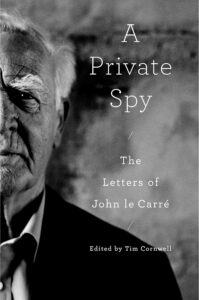
John le Carré, ed. Tim Cornwell, A Private Spy: The Letters of John le Carré
Viking, November 8
Just what it says on the tin: a collection of letters by the late literary great, sent to “writers, spies, politicians, artists, actors and public figures,” and sure to be chock full of gems. –ET
DeuxMoi, Anon Pls.
William Morrow, November 8
If you live on the Internet like the rest of us, you’ve no doubt encountered the wildly popular Instagram account @deuxmoi, the go-to for celebrity gossip. From its creator comes a fun debut novel that promises to be… everything you might expect from DeuxMoi: a celebrity stylist’s assistant starts a—you guessed it—celebrity gossip Instagram account one drunken night, and it goes viral. Suddenly, she’s fielding juicy anonymous tips and navigating the weird world of (anonymous) Internet fame. Basically, if you love Gossip Girl, this one’s for you. XOXO. –KY
Russell Banks, The Magic Kingdom
Knopf, November 8
In the latest novel from the author of Rule of the Bone and Cloudspitter, a property speculator looks back on his life in the first half of the 20th century. Margaret Atwood calls it “eerily timely,” and Paul Auster writes that “Banks is still working at full blast, creating work as good as anything he has ever done and—is it possible?—perhaps even better.” Huge if true! –ET
Kevin Wilson, Now is Not the Time to Panic
Ecco, November 8
Frankie Budge and Zeke are misfit teens in small, sad Coalfield, Tennessee. Together they make some cool, weird signs and plaster them all over town, sparking rumors and fear beyond anything they could have imagined. Twenty years later, Frances Eleanor Budge is a famous author, happily married with a great kid. When she receives a call from a journalist asking questions about “the Coalfield Panic of 1996,” Frances’s perfect life could be upended. Wilson’s novels often circle around young friendship and a mystery that makes the past present; the careful unpacking of untold secrets has a ripple effect that moves the narrative along, but it’s Wilson’s ability to pinpoint the most important parts of friendship and parental love that make each novel a must-read. –EF
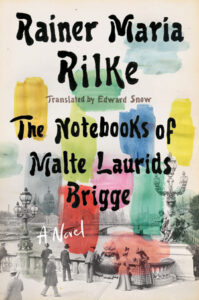
Rainer Maria Rilke, tr. Edward Snow, Notebooks of Malte Laurids Brigge
W.W. Norton, November 15
A new translation of Rilke’s only novel, a coming-of-age tale originally published in 1910, which as the publisher puts it, “confronts strikingly contemporary concerns of authorship, empathy, and the differences between appearances and reality.” Take me to the death-obsessed poet in the Parisian garret! –ET
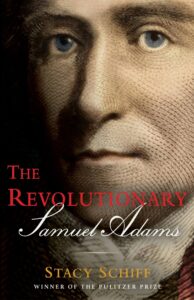
Stacy Schiff, The Revolutionary Samuel Adams
Little, Brown, November 15
Stacy Schiff’s biographies of Vera Nabokov, Cleopatra and the witches of Salem are must reads for their novelistic, thriller-like propulsion that make history more than fun, but literature. Her newest biography is of Samuel Adams, remembered as America’s founding father and a revolutionary leader. But Schiff tells the full story of Adams—how he grew from “the listless, failing son of a wealthy family” to the “silver-tongued revolutionary who rallied the likes of John Hancock and John Adams behind him.” –EF
Douglas Brinkley, Silent Spring Revolution: John F. Kennedy, Rachel Carson, Lyndon Johnson, Richard Nixon, and the Great Environmental Awakening
Harper, November 15
From bestselling historian Douglas Brinkley, a detailed history of the rise and energy of environmental activism during the sixties—a kind of revolution it looks like we’re going to need yet again. –ET
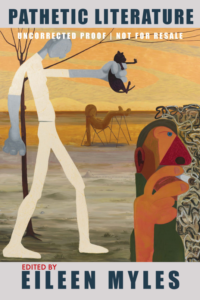
Eileen Myles, ed., Pathetic Literature
Grove Press, November 15
Eileen Myles (of Chelsea Girls and Cool for You) is reclaiming “pathetic.” Tracing the word back to its roots, they are taking us on a great literary tour of pathos, of feeling. Reaching across continents and genres, this anthology collects poetry, prose, and drama from the likes of Jorge Luis Borges, Gwendolyn Brooks, Lucille Clifton, Victoria Chang, and Qiu Miaojin (a personal favorite). When else does this spectacular gang get together under one roof? It’s a call for a rare kind of emotional honesty and earnestness and a response to our embarrassment over feeling feelings. –KY
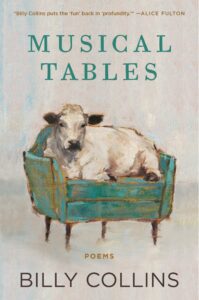
Billy Collins, Musical Tables
Random House, November 15
I consider the phrase “famous poet” to be an oxymoron, except for Billy Collins. The onetime poet laureate is back with a collection of entirely new poems, each just a handful of lines. Collins has said that the short poem is a sort of test for a poet: just as an artist should be able to draw a simple chicken, the poet should be able to channel meaning, emotion, profundity, and humor all through a couple of lines. Perhaps Collins is also aware of society’s rapidly diminishing attention-span, but he has created an undaunting, readable book of poetry that will appeal to all ages and hit you where it hurts. –JH
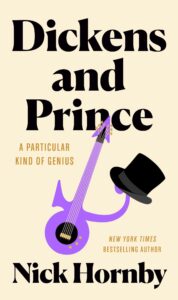
Nick Hornby, Dickens and Prince: A Particular Kind of Genius
Riverhead, November 15
Charles Dickens and Prince don’t jump off the page as a pair, but that’s the point of this book by the author of High Fidelity. Hornby was inspired by the two artists’ incredible productivity to begin drawing more connections between them, and the result, according to the publisher, is “a lively, stimulating rumination on the creativity, flamboyance, discipline, and soul it takes to produce.” –ET
Brigitta Olubas, Shirley Hazzard: A Writing Life
FSG, November 15
I came late to Shirley Hazzard’s brutal, brilliant short stories—but now I’m a full devotee. Thus I’m looking forward to reading the first biography of Hazzard, written by Brigitta Olubas, Hazzard’s authorized biographer. From an archive of letters, diaries, and notebooks, plus memories of her surviving friends and family, Olubas puts together a life that spanned continents to create a portrait of a writer who self-fashioned a persona, and a life, to be rediscovered alongside her fiction. –EF
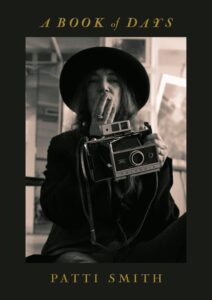
Patti Smith, A Book of Days
Random House, November 15
“Inspired by her Instagram” isn’t exactly the magic phrase that gets me excited for a new book, but for Patti Smith, I’ll make an exception. If you follow Smith, you’ll understand that she doesn’t use the app like a typical highlight-reel—she posts every day, sometimes a person, sometimes a landscape, sometimes an object, along with a small poem-like caption. She’s amassed quite a following by documenting the world in this way: it already reads like a photo diary. Taken all together, we see what she sees, we read what she thinks, and we understand that life is recognizable, and mundane, and poignant, and sometimes it takes looking through someone else’s eyes to see the beauty that’s right in front of us. –JH
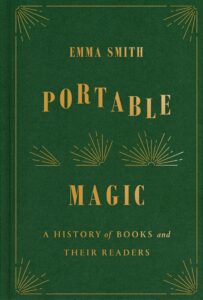
Emma Smith, Portable Magic: A History of Books and Their Readers
Knopf, November 15
I like books, so a history of the book is definitely on my TBR pile. In Portable Magic, Smith disrupts the Western myth that the Gutenberg Press was the original printing project, and traces the history of the book as object—from “decorative gift books that radicalized women to join the anti-slavery movement” to “paperbacks weaponized during World War II.” When we praise books, we’re often talking about the content inside them—but the story here is the relationship between book and reader and the spines, pages, and little rectangles that we carry with us. –EF
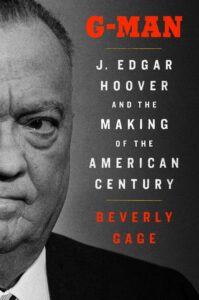
Beverly Gage, G-Man: J. Edgar Hoover and the Making of the American Century
Viking, November 22
A major (and massive, at 864 pages) new biography of J. Edgar Hoover from professor of 20th-century American history at Yale and the author of The Day Wall Street Exploded, which according to its publisher “places Hoover back where he once stood in American political history—not at the fringes, but at the center—and uses his story to explain the trajectories of governance, policing, race, ideology, political culture, and federal power as they evolved over the course of the 20th century.” –ET
Seamus Heaney, ed. Marco Sonzogni, The Complete Translations
FSG, November 22
The world is divided and divisive, but surely we can all agree on Seamus Heaney. This edition of his translations, edited by Marco Sonzogni, contains not only the works themselves but Heaney’s own writings on them, along with other context. For the completists! –ET
Heather Radke, Butts: A Backstory
Avid Reader, November 22
Heather Radke’s social history of female butts promises to be a deeply researched and thoroughly fascinating look (ogle?) at a body part that has long captured the cultural imagination. Radke talks to evolutionary biologists, models, and fitness gurus, and dives into the history of the racist objectification of women like Sarah Bartmann and Josephine Baker in an effort to understand our complex relationship with the butt. –JG

D.T. Max, Finale: Last Interviews with Stephen Sondheim
Harper, November 22
Earlier this year, New Yorker staff writer and David Foster Wallace biographer D.T. Max published an edited version of a series of interviews he’d conducted with legendary composer Stephen Sondheim, who died in November 2021. The interviews were meant to support a profile timed to coincide with a new musical Sondheim was working on, but now Max is publishing them, unedited, as a commemorative collection that is sure to be fascinating to Sondheim’s many fans. –ET
Makoto Shinkai and Naruki Nagakawa, tr. Ginny Tapley Takemori, She and Her Cat: Stories
Atria, November 22
Talk about a book after my own heart. This collection of four interrelated stories from renowned anime director Makoto Shinkai and the translator of Convenience Store Woman is already a bestseller in Japan. Each of the four stories is about a woman, her cat, and the search for connection in a sometimes lonely, oftentimes extraordinary world. (It hurts to be earnest, but in this case I AM.) –ES
Jason McBride, Eat Your Mind: The Radical Life and Work of Kathy Acker
Simon & Schuster, November 29
The first “full-scale” authorized biography of the legendary experimental writer draws on interviews with those who knew her along with, early drafts, letters, and private journals. “Unafraid to celebrate the complex intellectual histories that form both outer skin and inner guts of Acker’s work, her interweaving of ideology and aesthetics, her passionate conviction that the avant-garde was something to be lived as much as written,” writes Tom McCarthy, “McBride has produced a study genuinely faithful to his brilliant, difficult subject.” At last!


